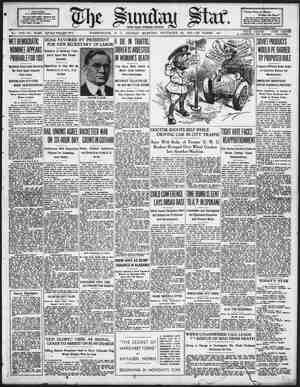Evening Star Newspaper, November 23, 1930, Page 107
You have reached the hourly page view limit. Unlock higher limit to our entire archive!
Subscribers enjoy higher page view limit, downloads, and exclusive features.
THE The unpleasant memory. Some people are born with a faculty for assembling gruesome facts and hanging on to them. Just such a person is Mrs. Harold Wigge. “Twenty-eight?” she will comment brightly. “Why, Lucia, vou must be 38 if you're a day! Because I remember Aunt Hattie sent me over with a little combing jacket she made for you on your seventh birthday anniversary, and that was in 1899, I'm sure, because it was the year mother took me to see Maude Adams in ‘The Little Minister,’ and 1 was sick coming home in the trolley car.” The blank memory. “Contrast the style of Chaucer with the methods employed by the poets of the Restora- tion period and illustrate by examples from what you read.” (Dudley is Al on bits from “All Quiet on the Western Front,” “The Corpse With the Winking Eye” and several other lately perused volumes, but memories of Mr. Chaucer’s works just will not come to mind.) il SUNDAY WASHINGTON, D. (.—GRAVURE SECTION—NOVEMBER The Halls of Memory By W. E. Hill (Copyright, 1930, by the Chicago Tribune Syndicate.) STAR. “When You and I Were Young, Maggie,” sang a poet of the blithesome nineties, and fond memory is painting a fleeting picture for Margaret and Walhce of the days whe_n they were sweethearts before Margaret married the bank cashier and Wallace took his employer’s only child for better or for worse. The college memories. These lovely girls are a couple of old college grads talking over the old days on and off the campus. “Will you ever forget,” reminisces old grad No. 1, “the time those three Amherst sophomores took us to dinner at Boyden's, and we did1't know what to order, and Alice Mould spilt mayonnaise on her room- mate's pony coat?” The memory for faces. “I re- membered your faces right away. I never forget a face, but 1 couldn’t recall the name!” The sentimental memories. Aunt Grace is spending such a happy day at the university with her freshman nephew, meeting all the upper class fraternity brothers and telling them about Laurence’s home life. “He was such a sweet child I hated to have him grow up. He used to have a doll named Jemima that he always took to bed with him, and even when he was given a bath he had to have Jemima with him.” i 23, 1930. Miss Mabel Mantle has one of those day-before-yesterday memories which causes her to look saucer-eyed and vague—no easy matter after the crow’s feet begin to creep in—when any- thing before 1920 is brought into the conversation. “I was such a tiny tot when the great war commenced that I can hardly remember anything connected with it, except that we all saved and saved every scrap of tinfoil we could lay our hands on!” The helpful memory. There's usually a lot for the younger generation to learn from Mrs. Huggins' store of girlhood memories. What her mother said and how she profited by it, and never forgot, and so forth. “I remember, Gertrude, my mother once saying to me,” begins Mrs. Huggins, “‘a lady is known by the company she keeps.'” And after Gertrude has digested this Vic- torian wisecrack she will say: “Oh, mother, please don’t say things like that. You've no idea how it dates you!” The embellished memories. “I recall Gen. Grant sending for me to step over to see him in his tent at Bull Run and how he said to me, ‘Silas," he said, ‘you may be only a corporal, but if Lincoin and Seward and the rest had you in Washington there'd be a lot more efficiency.’” Uncle Silas’ memory goes so far back there are very few who can dispute his veracity. ~——/ M
